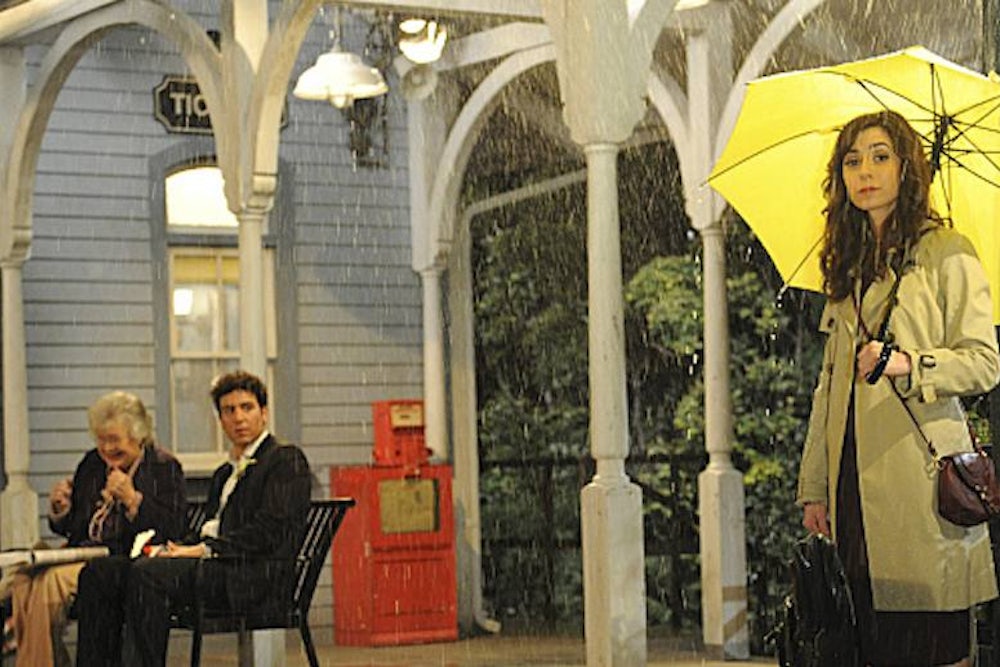“How I Met Your Mother” has been called the “Lost” of sitcoms: ambitious in its non-linear storytelling, structured around flashbacks and flash-forwards and unreliable narration, filled with clues for fans to exhaustively catalogue. The show’s framing device—a middle-aged guy in 2030 tells his two kids a long-winded story of how he met their mom—meant the finale would have a lot riding on it. And so perhaps it’s not surprising that last night’s series finale added one more similarity to “Lost”—a deeply unsatisfying, even infuriating, ending.
The best sitcom finales—“30 Rock” for example, or “Cheers”—succeed by simply reminding the audience of what they loved about the show in the first place. But “How I Met Your Mother” had much more at stake in this final episode, the long-awaited culmination of a nine-year story about how Ted (Josh Radnor) met the woman he would marry and have children with. Yes, Ted did meet the mother last night, in a sweet, low-key scene that’s been teased for seasons: Ted and Tracy McConnell (we finally learned her name) flirt awkwardly while huddled under a yellow umbrella in the rain. We saw the gang—Ted, Robin, Barney, Lily, and Marshall—in their future lives, flashing forward to 2016, then 2019, then 2024 as they experience divorce, fatherhood, career success, graying hair. But then we got to the big twist: that this wasn’t a story about how Ted met the mother at all. The mother was, as Alyssa Rosenberg put it, a Macguffin. This was really a story, we learned in the finale’s final minutes, of how Ted, after mourning his dead wife for six years, realized in 2030 that he’s “totally in love with Aunt Robin.” Or in the words of Ted’s son, he “totally, totally ha[s] the hots for Aunt Robin,” the ex-girlfriend he’s been hung up on since episode one.
And that, kids, is how you screw up the ending of a long-running TV show.
Even in its weak and baggy later seasons, “How I Met Your Mother” was as sentimental as it was goofy, deftly handling life’s compromises and sorrows alongside its triumphs: Marshall’s father dying, or Robin learning she’s infertile. And so when I first read the theories floating around the Internet that the show might end with the mother’s death, I wasn’t particularly worried. That ending could have been meaningful—like a spiritual descendant of the finale to “The Wonder Years,” where the narrator revealed that Kevin and Winnie wouldn’t end up together and Kevin’s father would die in a few years.
But the HIMYM ending was both depressing and annoying, a clever trick played on the audience. And worse, it negated the emotional journeys these characters had taken. Barney’s growth was suddenly dropped, and his marriage to Robin dispatched within the episode’s first ten minutes. Then there was Ted: The sap had spent years fixating on the dream of Robin, believing grand romantic gestures and destiny could create a sustainable relationship. So after a season showing his sweet, unflashy relationship with Tracy, watching Ted go to Robin’s apartment to make the exact same grand gesture he made in the first episode felt less like a fun callback than a retread. (Though all this might be easier to overlook if the episode itself wasn’t so clumsy, abandoning the show's signature rapid-fire style in favor of long scenes uninterrupted by any narration or cutaway gags for the entire second half.)
“As with novels, the endings matter; it’s highly possible for a show to unravel the long pleasure of the journey with a clumsy third act,” Rachel Syme wrote in The New Yorker last month, in an essay on “True Detective”’s disappointing close. Carter Bays and Craig Thomas, the creators of “How I Met Your Mother,” likely agreed; they planned the show’s ending back in the second season. There was a practical reason for this—the finale’s final scene was actually written and recorded eight years ago, before the actors playing Ted’s kids could age out of the roles—but Bays and Thomas often cited their show’s outlined structure as a reason to maintain faith in its frustrating plotting.
There’s often an expectation that television is best when the writers know where they’re going, when they’re not “making it up as they go along”—an accusation that the writers of “Lost” and “Battlestar Galactica” fielded throughout those shows’ run, and particularly after the endings. But there’s something to be said for writing by the seat of your pants. A finale that might have seemed clever three or four seasons ago makes little sense now, in a show that spent so long getting the audience invested in the Ted-Tracy and Robin-Barney relationships. After all, “True Detective” was neatly planned, and its finale was still an enormous anticlimax. With their last scenes scripted and shot years in advance, the “How I Met Your Mother” writers locked themselves into an ending that couldn’t change as the show itself evolved over nine years.
It’s particularly disappointing after the show has rallied in these last few weeks; two weeks ago, an episode displayed exactly the sort of elegant ending Carter and Thomas could have written if they had allowed themselves, in a scene that panned through the fate of the show’s recurring characters. It was clever and bittersweet, emotionally manipulative but nakedly so, reminiscent of “Six Feet Under”’s lovely final sequence that showed us every character’s death in the decades after the series came to a close.
“How I Met Your Mother” had a few seasons of excellent comedy—funny, heartfelt, innovative—and this finale doesn’t erase those. But it leaves a sour aftertaste to everything that came before. “I’m done being single,” Ted declared in the first episode, certain in his plan for the future. It would take another nine years before we finally saw him settle down, as the show’s universe showed him again and again the futility of planning out the future. Ted seemed to get the message in the end; the “How I Met Your Mother” writers, unfortunately, never did.
